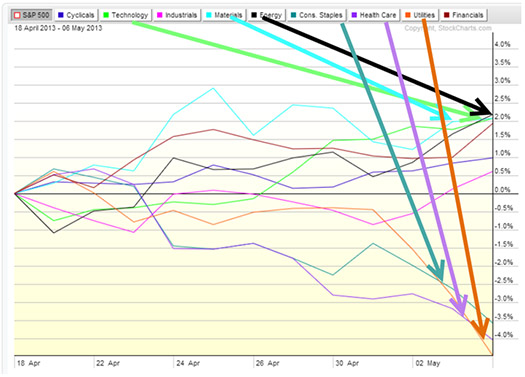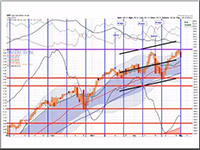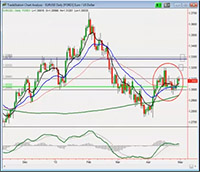Tharp's Thoughts Weekly Newsletter (View On-Line)
-
Article Early Origins of the Money Game by Van K. Tharp, Ph.D.
-
-
Trading Tip Unwinding the Defensive Trade by D. R. Barton, Jr.
-
Videos Ken and Gabriel Share Their Trades
-
News A Position Sizing Strategy Contest and The NEW Tharp Think Video Workshop!
 $700 Early Enrollment Discount Ends TODAY $700 Early Enrollment Discount Ends TODAY
on Swing and Forex Workshops!
Don't miss out on attending these two technical workshops taught by Ken Long and Gabriel Grammatidis. Register by the end of the day today to take advantage of the $700 early enrollment discounts.
For more information or to register, click here.

Early Origins of the Money Game
Croesus and Greek Civilization
by Van K. Tharp, Ph.D.
View On-line
When I first proposed writing a series of articles on the money game, I received a complaint from someone who said that most of my focus was on Americans. What about the Europeans or Asians? Well, there were reasons for my emphasis on Americans. First, while I was concentrating on some of the richest people of all time (including the Rothschilds and the Medicis), most of the people on that list prospered in the United States between 1850 and 1910. The period of time after the American Civil War was one of the greatest times for profit in the history of the world. You could make your own rules for playing the game because there was minimal government regulation in American business and no income tax. Those two factors had a huge impact on wealth accumulation. For example, I believe my net worth would probably be about 100 times what it is now if there was no income tax today. In any case, those who played the game well in the US in the fifty years after the Civil War became money giants.
For much of the history of Europe and Asia, one has to consider the impact of royalty on the wealth factor. If you had a significant amount of money in an area that had an all-powerful ruler, then there was a good chance that the ruler considered everything in the kingdom as belonging to him. Thus, if you didn’t play good politics with the royal family, they could take your money away. In fact, royal families would have to be considered part of the money game in old Europe and that’s not a relevant factor today.
Nevertheless, I just finished a great book, The History of Money, which inspired the next three articles in the money game series. These next three articles will not focus on particular people, but on particular eras.
- This article will cover the ancient Greeks and the development of gold and silver coins.
- The second will be on the money’s impact on the rise and fall of the Roman Empire.
- And the third will talk about the impact of the Roman Catholic Church on the money game with a special reference to the Knights Templar.
The Origins of Coinage
Most everyone has heard the phrase “Rich as Croesus.” Well, Croesus basically changed how the money game was played. The ideas of the Lydian kings, like Croesus, paved the way to incredible wealth and to a culturally rich society — the Greek Civilization. So, how did that happen?
Homer portrayed people of combat and heroism and wrote about anger, war, heroism, passion, violence, honor, etc. Money had no place in the poems of Homer because people were only interested in honor. Towns tried to be as self-sufficient as possible so they would not have to trade with neighbors; neighbors could be dangerous.
Somewhere around the seventh century BC, the Lydian people who inhabited the western part of modern day Turkey, recognized the need for a portable wealth. They manufactured coins made of electrum, a naturally occurring mix of gold and silver. These coins were thick slugs about the size of the end of one’s thumb. Each coin was stamped with a lion’s head to guarantee its authenticity and standardized in weight and size to eliminate the need to assess its value each time it was used. This made trading easy and it opened up trade to new segments of the population.
Around 560BC, Croesus ascended the throne in the kingdom of Lydia and things started to change. During his 14 year reign, Croesus created new coins made of pure silver and gold. This created more opportunity for commerce and the invention of the retail market. Rather than having to find the home or shop of a craftsman, you could go to a central market to purchase items there. Anyone could come to the central market and buy or sell items with gold and silver coins.
Coinage also affected traditional societal roles. The Greek historian, Herodotus, was said to have been horrified to find that women could choose their own husbands because they could have dowries to aid them in their selection. In addition, the first known brothels arose around these times as part of the “market.” Women could work in the brothels long enough to secure a dowry big enough to find the husband they wanted. In addition, the Lydians were credited for creating the first gambling games around this time.
Commerce created the fabulous wealth of Croesus. But he also squandered it on two common weaknesses for kings — buildings and armies. It was said that he conquered most of the other Greek cities, after which he built extensively in them. This process eventually led to his downfall. As he considered a campaign against the Persian Empire, Croesus asked the oracle at Delphi what chance he had and was told a great empire would fall. Croesus interpreted the prophecy as a favorable sign that he would conquer the Persians but it was his great empire that would fall.
The Ancient Greeks
After Croesus fell, the surrounding Greeks adopted the Lydian practice of making coins and commerce began to flourish throughout the Mediterranean. Eventually, the Greeks replaced the Phoenicians as the greatest traders of the Eastern Mediterranean.
Coinage offered stability to this trade because it provided merchants with a permanent medium of exchange. Previously, money had consisted of some prominent, but usually perishable commodity. Once money was based upon rare metals, however, these coins provided people with:
- Ease of use
- Standardization and
- A non-perishable way of storing wealth.
At the time, other civilizations had been based on a strong authority supported by a massive army and by wealth collected as tribute. Kinship and brute force were the primary methods for organizing societies.
Money helped Greece organize its society on a much greater scale than was previously possible. Money didn’t require extensive administration, police or military systems. Money especially suited Greece at that time because it was a loose structure of many relatively independent city states.
Those in power saw the advantages money offered them. They could collect money for taxes rather than collect commodities which could perish before they were used. Even crimes could be monetized so if someone committed a crime, they could pay a penalty rather than being killed.
In addition to money providing a medium of exchange for goods, it allowed payment for services. People could work and get paid for doing a service and that service had value. Not only could you buy a loaf of bread, you could also pay someone to clean your house, commission a poem, or obtain sexual services – all because of money. People began to work to get paid rather than being forced to do so.
Money enabled an artistic culture to develop. People could produce a work of art (music, painting, a play, etc) and get paid to do so. Athens became a center for artistic culture and flourished as one of the wealthiest Greek city-states. Interestingly, the basis for most of Athen’s money was silver for which they had an ample supply after discovering rich deposits in Laurium, south of the city.
Politics too started to change as a result of money. The Greeks had to deal with debt and at one point they passed a law canceling it. It didn’t work, but at least they tried. Prior to money, you could only vote if you owned land. But after the development of coinage, having wealth also gave you the privilege to vote. Essentially a great civilization flourished, and the center of that civilization was the marketplace.
Too little was written during that particular era of history to understand how individuals played the money game; however, it was obvious that the rules of the game changed considerably as coinage emerged and evolved. Greece went from a society dominated by honor to one dominated by commerce, in which culture was now able to flourish. Those who had the ability to see what was happening could easily dominate the money game, however, there are insufficient records to know who those people were and how they played.
About the Author: Trading coach and author Van K. Tharp, Ph.D. is widely recognized for his best-selling books and outstanding Peak Performance Home Study Program—a highly regarded classic that is suitable for all levels of traders and investors. You can learn more about Van Tharp at www.vantharp.com. His new book, Trading Beyond The Matrix, is available now at matrix.vantharp.com.
Trading Education
Why Don't You Trade Forex?
- "I’m too small to trade against the mega banks & hedge funds"
- "It’s a 24 hour market - I have to work and sleep some time!"
- "I can’t keep up with all the macro economic trends for the economies of the world."
- "I don’t even know half the currencies out there, how could I trade them?"
Here Are the Realities:
- The currencies market is the most liquid market in the world.
- It’s easily accessible and tradable by individuals today.
- Forex does not require huge amounts of capital to trade.
- The technical aspects of trading Forex are much more similar to trading equities or futures than they are different.
Don’t believe that last point? Take this test and see for yourself.
If you missed the Forex Article in a recent newsletter, click here
May 17-19 |
Swing Trading with Ken Long
$700 Early Enrollment Discount Ends Today
|
May 21-23 |
Forex Trading with Gabriel Grammatidis
$700 Early Enrollment Discount Ends Today
|
| June 8-9 |
Oneness Awakening Weekend
New Dates |
July 13-14 |
Core Trading Systems
Longer Term Trading Systems from Ken Long
|
October 3-14 |
Peak Performance 101, 202 and 203
Just Announced!
|
It is confirmed! Van will bring three VTI Workshops to Berlin this Fall Including Forex Systems with Gabriel Grammatidis.
| Berlin, Germany Workshops |
September 6-8 |
How to Develop a Winning Trading System
with Van Tharp and RJ Hixson
|
September 10-12 |
Blueprint for Trading Success
with Van Tharp and RJ Hixson
|
September 14-16 |
Forex Trading
with Gabriel Grammatidis
|
Register for all 3 and save $800!
To see the full schedule, including dates, prices, combo discounts and location, click here.
Trading Tip
Unwinding the Defensive Trade
by D. R. Barton, Jr.
View On-line
Back in early April, I reported that everything I was reading said the market has hit a high in April for the last three years, and in effect turned into a big pullback from between 10% and 19%. I discussed my skepticism that we would get an April plunge based on some simple sentiment readings along with my own analysis. When everyone leans one way, the market has a tendency to go the other, at least for the short term.
In my April 24th article (“I Can’t Believe It’s Not Cyclicals”), I discussed how the traditionally defensive or counter-cyclical sectors, like health care, utilities and consumer staples, have been leading the charge in an up market — a very unusual occurrence. (Thanks to all of you who took time to write in about the article and for your kind words — I read every email and replied to all of them to the best of my knowledge!) My conclusion was that this bull run would not end until institutional and retail investors were convinced that the bull would last “forever” and start rotating funds into higher beta cyclical sectors like technology and materials.
Game On – It’s Scary When We Hit the Nail on the Head
Since that piece on cyclical vs. counter-cyclical sector performance, the scenario is playing out almost exactly according to our playbook; the market is making new highs and the sector rotation is in full swing. Money is rotating out of the once-strong defensive sectors and into cyclical areas. Take a look at this sector performance chart over the last 13 trading days:

Wow — while the market has been making new all-time highs, the three leading sectors from the previous four months have now become the laggards — and the difference is pretty striking. Utilities, health care and consumer staples are at the bottom of the page, while technology, energy and materials have vaulted to the top.
While a few trading weeks don’t necessarily mean that the market tide has changed, it is certainly a good start. Investors are now chasing growth and spending less on defensive names. This opens the door for a new round of up-moves in the market and those who are scared they’ll miss the bull will either put cash to work or rotate into cyclical sectors.
We should note another important point here: during the first four months of the year, investors were not just grabbing up defensive sectors — they were also seeking yield where ever they could find it. Hence, blue chip stocks paying a “high” dividend like the utilities, and consumer icons such as P&G enjoyed massive run-ups that fueled the counter-cyclical boom. Next week, we’ll dig more into how the “rush to dividends” play seems to be ending like the defensive stock play.
As always, your comments and feedback are welcome! Please send them to drbarton “at” vantharp.com
Great Trading,
D. R.
About the Author: A passion for the systematic approach to the markets and lifelong love of teaching and learning have propelled D.R. Barton, Jr. to the top of the investment and trading arena. He is a regularly featured guest on both Report on Business TV, and WTOP News Radio in Washington, D.C., and has been a guest on Bloomberg Radio. His articles have appeared on SmartMoney.com and Financial Advisor magazine. You may contact D.R. at "drbarton" at "vantharp.com".
Disclaimer
Trade Videos
Ken Long: Intraday Trades
In this 22 minute trading lesson, Ken describes several intraday trade case studies for May 1 and May 2. Before he starts his intraday trading, he looks at the overall market picture and then moves to a swing timeframe lens which informs him on possible intraday trade candidates. See how he applies this context to a number of regression line crossover and sideways quiet channel opportunities that came up over the first two days of this month.
Click Here to Watch the Video
Gabriel Grammatidis: Forex Trade
In this 8 minute video, Gabriel Grammatidis talks about a trade setup in early May. It’s the same pattern he wrote about in the article he wrote last month but applied to a higher timeframe. Gabriel finds price consolidations a regular and frequent occurrence in the currency markets. In this He explains how he prepares for the ultimate breakout and sets his target prices for exits in this Euro/USD case study.
Click Here to Watch the Video
Last Week to Submit your Position Sizing Ideas
for a Chance to be in the Next Edition of
The Definitive Guide to Position Sizing
We know we have creative, innovative clients who, no doubt, use position sizing methods that could be useful to other traders. If you are willing to share a great position sizing idea, we’d be willing to attribute the idea to you in the new edition of The Definitive Guide to Position Sizing and also give you a free copy of the book when it comes out later this year.
Read more about the contest and how to enter here.
For the first time, Van Tharp is releasing a workshop via online video!
Tharp Think Video Webinar
We know you want more remote learning opportunities and we are excited to announce that we are moving in that direction. We start our online video courses with the first workshop that we recommend all traders take; The Tharp Think Workshop. The Tharp Think Workshop introduces traders to the critical concepts that Van believes every trader needs to succeed, and for consistently profitable trading over the long term.
Click here for more information
Ask Van...
Everything we do here at the Van Tharp Institute is focused on helping you improve as a trader and investor. Consequently, we love to get your feedback, both positive and negative!
Click here to take our quick, 6-question survey.
Also, send comments or ask Van a question by clicking here.
Back to Top
Contact Us
Email us at [email protected]
The Van Tharp Institute does not support spamming in any way, shape or form. This is a subscription based newsletter.
To change your e-mail Address, e-mail us at [email protected].
To stop your subscription, click on the "unsubscribe" link at the bottom left-hand corner of this email.
How are we doing? Give us your feedback! Click here to take our quick survey.
800-385-4486 * 919-466-0043 * Fax 919-466-0408
SQN® and the System Quality Number® are registered trademarks of the Van Tharp Institute
Be sure to check us out on Facebook and Twitter!
 
Back to Top |